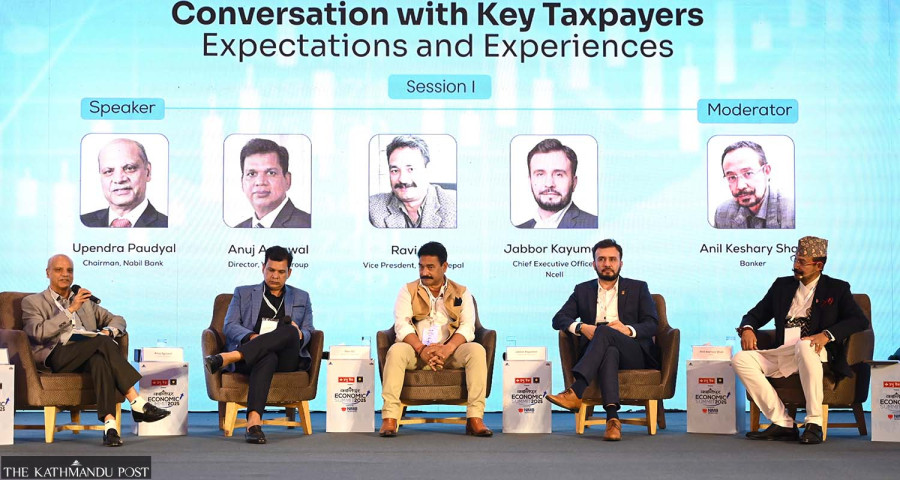Money
Business leaders voice frustration over state inertia
Private sector leaders at the Kantipur Economic Summit criticise the slow implementation of reforms, citing high taxes, policy instability, and a lack of trust.
Post Report
Private sector leaders have voiced growing frustration over the government’s persistent failure to implement long-promised reforms.
Speaking at the 5th Kantipur Economic Summit in Kathmandu on Wednesday, they said that although business leaders acknowledged that their concerns are often noted in government reports, policies, and budget speeches, they emphasised that meaningful action remains scarce.
Chandra Prasad Dhakal, president of the Federation of Nepalese Chambers of Commerce and Industry (FNCCI), criticised the sluggish pace of budget implementation. He warned that without genuine follow-through, economic transformation will remain elusive.
Companies such as Ncell and Nabil Bank echoed this sentiment, pointing to high taxation, unpredictable regulations, and poor policy to let the private sector thrive.
Despite significant contributions to the national economy, the businesses feel they are treated suspiciously rather than as partners in national development, arguing that this dynamic has eroded trust and discouraged investment.
This year’s summit focused on deepening the understanding of Nepal’s economic obstacles and identifying actionable reforms through thematic sessions like “Conversation with Key Taxpayers: Expectations and Experiences” and “Budget: Beyond Figures, Towards Purpose”.
Former finance secretary Rameshore Khanal, who chaired the High-Level Economic Reforms Recommendation Commission, struck a comparatively optimistic tone.
He observed that the government this time appears more receptive to reform. Unlike in the past, when important reports gathered dust, the latest commission report was made public immediately. He contrasted this with the delayed and ultimately disregarded Public Expenditure Review Commission report under Dilliraj Khanal, which suffered from political instability.
Khanal recalled his experience with the 1992-93 Public Expenditure Review Commission, which led to decisive actions, including the slashing 222 projects and reducing the national budget from Rs50 billion to Rs40 billion under then-finance minister Ram Sharan Mahat.
He hoped that such boldness would inspire the current administration to move decisively.
He said the early 1990s reforms opened a single window in a sealed room, while today's efforts aim to open all the windows simultaneously.
He also suggested that Nepali youth should be allowed to invest abroad in line with legal frameworks, arguing that Nepal’s sustainable growth depends not only on domestic development but also on leveraging offshore investment opportunities.
Khanal further urged a reevaluation of Nepal’s fixed exchange rate policy with India. According to him, this long-standing peg has constrained the country’s production capacity and limited the competitiveness of domestic products.
However, the private sector remains unconvinced by the government’s pledges.
Chandra Prasad Dhakal, speaking again during the “Search for Meaning, Not Numbers” session, said that while government documents routinely acknowledge private sector recommendations, there have been few changes in practice.
He pointed out that even though laws and policies now reflect many of the businesses' concerns, the lack of on-ground implementation continues to stifle progress. He insisted that unless these reforms are acted upon urgently, companies will not be able to thrive.
Dhakal stressed that while revenue mobilisation is essential, treating taxpayers as adversaries rather than partners will ultimately be counterproductive.
Jabbor Kayumov, CEO of Ncell, expressed dismay at the telecom sector's regulatory challenges. He lamented that their concerns are often ignored or misinterpreted despite consistently raising issues with the authorities.
Kayumov highlighted the severe impact of high taxes, noting that 60 percent of the company’s revenue goes to the government in taxes, while another 20 percent is used for infrastructure development.
With only a fraction of revenue left for innovation and technological upgrades, he argued that the sector cannot keep pace with developments like 5G.
Kayumov pointed out that the telecom sector still feels overlooked despite contributing over Rs340 billion to the state treasury in the past two decades, including Rs11 billion to the Rural Telecommunications Development Fund.
He warned that companies, like neglected plants, will wither without proper care.
Citing India’s successful 5G rollout, he attributed its success to a business-friendly environment that encourages reinvestment, something he believes is impossible in Nepal. Even Bhutan, Kayumov added, offers better tax exemptions for telecom providers.
Ravi KC, vice-president of Corporate Affairs at Surya Nepal, focused on how Nepal’s complex regulatory environment has deterred multinational investors.
He explained that it’s not due to a lack of interest—multinationals were eager to invest in Nepal three decades ago—but that current hurdles, including delays in Environmental Impact Assessment and complicated registration procedures, now serve as practical barriers.
He mentioned Surya Nepal’s hotel project in Hattigauda, which has been stalled for six years due to issues related to land ceiling regulations.
KC questioned the rationale of applying individual land ownership limits to industrial projects and revealed that despite being prepared to invest Rs6 billion, the project remains in limbo.
KC argued that Nepal has the potential to become an industrial hub, thanks to its access to clean energy, affordable labour, and strategic location between two economic giants—India and China. “However, these advantages will remain theoretical unless investment barriers are lowered.”
Upendra Paudyal, chairman of Nabil Bank, spoke about the mounting difficulties in the banking sector. He detailed the sector’s contribution to the national treasury, revealing that the bank paid Rs11 billion in taxes in the past five years alone and another Rs10 billion under Tax Deducted at Source (TDS).
Yet, Paudyal raised serious concerns about the unpredictability of government policy, particularly regarding retrospective taxation.
He disclosed that the bank had recently been compelled to pay Rs1.62 billion in back taxes, even though there had been no prior notice or legal groundwork for such an assessment. Such moves, he argued, make the investment climate unstable. He said investors need certainty and consistency; changing the rules after the game begins will only scare capital away.
Amrita Sharma, a digital sector expert, highlighted the quality of manpower in Nepal’s tech industry.
She said that although more than 17,000 graduates enter the digital sector each year, many lack the skills and capacity employers require. As a result, companies often have to retrain about 85 percent of fresh graduates over six to nine months. However, many of these skilled workers leave after being trained, further deepening the talent gap.
Sharma acknowledged Nepal’s digital potential but emphasised that this potential will not be realised without foundational investment.
Kailash Sirohiya, chairman of the Kantipur Media Group, placed responsibility squarely on systemic political and bureaucratic failures. He highlighted the disconnect between political leaders' rhetoric and actual governance, arguing that while leaders publicly promise a private-sector-friendly environment, their actions betray indifference.
He cited the long delay in appointing a new governor for Nepal Rastra Bank as a striking example of bureaucratic inertia and political interference.
According to Sirohiya, the committee responsible for the appointment has not convened, and some of its members have already resigned. He warned that this indifference undermines the central bank's autonomy and called the situation a dangerous precedent.
Urging swift and transparent action, Sirohiya cautioned that such inaction is accelerating institutional erosion.
In response, Finance Secretary Ghanshyam Upadhyay stated that the government is taking steps to improve policy implementation. He said a commission with private sector representation has been formed to address core issues and that the upcoming budget would focus less on size and more on productivity.
Upadhyay assured that the government is committed to translating policies into tangible actions to boost public sector efficiency and private sector growth.




 10.97°C Kathmandu
10.97°C Kathmandu














